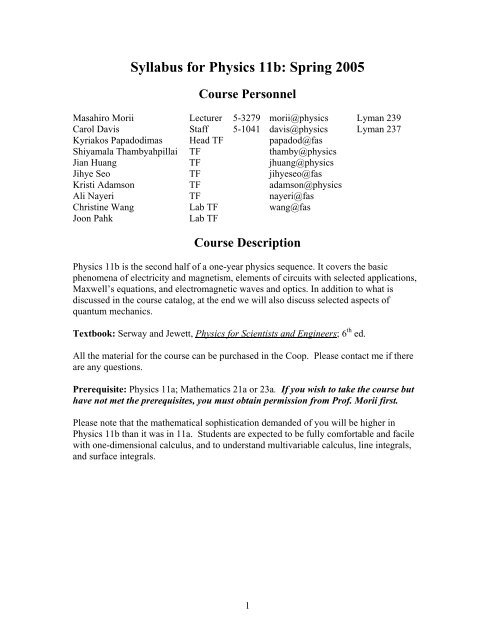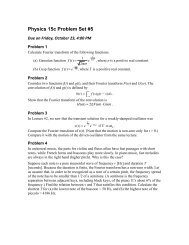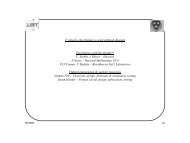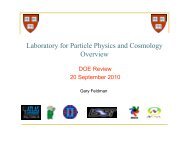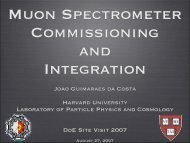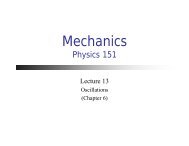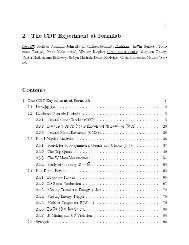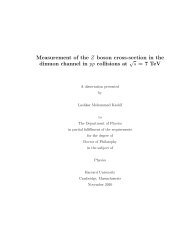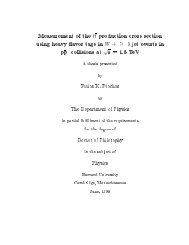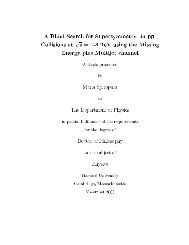Syllabus - Harvard University Laboratory for Particle Physics and ...
Syllabus - Harvard University Laboratory for Particle Physics and ...
Syllabus - Harvard University Laboratory for Particle Physics and ...
You also want an ePaper? Increase the reach of your titles
YUMPU automatically turns print PDFs into web optimized ePapers that Google loves.
<strong>Syllabus</strong> <strong>for</strong> <strong>Physics</strong> 11b: Spring 2005<br />
Course Personnel<br />
Masahiro Morii Lecturer 5-3279 morii@physics Lyman 239<br />
Carol Davis Staff 5-1041 davis@physics Lyman 237<br />
Kyriakos Papadodimas Head TF papadod@fas<br />
Shiyamala Thambyahpillai TF thamby@physics<br />
Jian Huang TF jhuang@physics<br />
Jihye Seo TF jihyeseo@fas<br />
Kristi Adamson TF adamson@physics<br />
Ali Nayeri TF nayeri@fas<br />
Christine Wang Lab TF wang@fas<br />
Joon Pahk<br />
Lab TF<br />
Course Description<br />
<strong>Physics</strong> 11b is the second half of a one-year physics sequence. It covers the basic<br />
phenomena of electricity <strong>and</strong> magnetism, elements of circuits with selected applications,<br />
Maxwell’s equations, <strong>and</strong> electromagnetic waves <strong>and</strong> optics. In addition to what is<br />
discussed in the course catalog, at the end we will also discuss selected aspects of<br />
quantum mechanics.<br />
Textbook: Serway <strong>and</strong> Jewett, <strong>Physics</strong> <strong>for</strong> Scientists <strong>and</strong> Engineers; 6 th ed.<br />
All the material <strong>for</strong> the course can be purchased in the Coop. Please contact me if there<br />
are any questions.<br />
Prerequisite: <strong>Physics</strong> 11a; Mathematics 21a or 23a. If you wish to take the course but<br />
have not met the prerequisites, you must obtain permission from Prof. Morii first.<br />
Please note that the mathematical sophistication dem<strong>and</strong>ed of you will be higher in<br />
<strong>Physics</strong> 11b than it was in 11a. Students are expected to be fully com<strong>for</strong>table <strong>and</strong> facile<br />
with one-dimensional calculus, <strong>and</strong> to underst<strong>and</strong> multivariable calculus, line integrals,<br />
<strong>and</strong> surface integrals.<br />
1
Logistics<br />
Lecture<br />
The course will meet Tuesdays <strong>and</strong> Thursdays from 10:00-11:30, in Science Center B.<br />
Lecture is intended to cover the same material as the readings, though not necessarily in<br />
precisely the same style, <strong>and</strong> with more responsiveness to you personally. Your<br />
questions on the difficult parts of the material are the most important thing <strong>for</strong> you to<br />
bring to lecture, <strong>and</strong> you should ask them in lecture as they occur to you. For this reason<br />
it is important to have read the assigned readings be<strong>for</strong>e lecture.<br />
Sections<br />
You must sign up <strong>for</strong> a section between Thursday, Feb. 2, <strong>and</strong> Wednesday, Feb. 8,<br />
afternoon using the course sectioning software. Section assignments will be distributed<br />
on Friday, Feb. 10. You will need to consult with Prof. Morii if you wish to alter your<br />
section, or sign up <strong>for</strong> section, after this time. For the week of Feb. 6-10, there will be no<br />
official section meetings. However, section-leading TFs will be holding office hours in<br />
the section rooms. Visit your favorite section to get to know the TF.<br />
Office Hours<br />
Day Time Location<br />
Monday 2-3 PM SC 113, SC 216<br />
Tuesday 2-3 PM SC 113, SC 216<br />
3-4 PM SC 113<br />
7-8 PM SC 216<br />
Wednesday 9-10 AM SC 216<br />
1-2 PM SC 222, Jefferson 267<br />
7-8 PM SC 304<br />
Thursday 9-10 AM SC 216<br />
2-3 PM SC 113<br />
3-4 PM SC 113<br />
Prof. Morii will have office hours Tuesday <strong>and</strong> Wednesday afternoons (time to be<br />
announced). Please contact him if you would like to set up an appointment <strong>for</strong> another<br />
time. The TFs will announce their office hours at the sections.<br />
Weekly Homework<br />
Weekly homework will be regularly due on Fridays at 4 PM, in the mailboxes outside<br />
Science Center 109. Solutions will available on the web, beginning at 4 PM. Late<br />
homework will not be accepted. There will not be homework due in weeks with<br />
midterm exams, <strong>and</strong> of course the first Friday. Homework assignments distributed the<br />
week be<strong>for</strong>e a midterm will be due a week after the midterm, covering the extra lecture<br />
the week of the midterm.<br />
2
<strong>Laboratory</strong><br />
The course also consists of laboratory work. You will also choose lab sections when you<br />
choose weekly TF sections. Each lab will be set up <strong>for</strong> two weeks, <strong>and</strong> you will attend<br />
one section every two weeks. There are five labs overall. First labs start on the week of<br />
Feb. 14. Lab reports are due 1 week after the day of the lab at 8 AM, in the mailbox<br />
outside Science Center 109. (If, <strong>for</strong> example, you do a lab on a Tuesday, the report is due<br />
next Tuesday at 8 AM.) Late laboratory work will not be accepted, <strong>and</strong> switching<br />
sections is not allowed except <strong>for</strong> medical, religious, <strong>and</strong> similar reasons. If you find,<br />
when signing up <strong>for</strong> lab sections, that there is no section which you can attend regularly<br />
without unalterable conflicts, please see Prof. Morii. Otherwise, once you have signed up<br />
<strong>for</strong> a laboratory section it is assumed you can make it to all meetings of the section.<br />
Week Day Hours (PM)<br />
1 Tuesday 12:00-3:00 3:30-6:30 7:00-10:00<br />
Wednesday 12:00-3:00<br />
Thursday 12:00-3:00 3:30-6:30<br />
2 Monday 3:30-6:30 7:00-10:00<br />
Tuesday 12:00-3:00 3:30-6:30 7:00-10:00<br />
Wednesday 3:30-6:30<br />
Weekly Reading<br />
All readings are from the course textbook, Serway <strong>and</strong> Jewett, available in the Coop.<br />
Each week’s homework assignment will detail the precise sections to be read; the course<br />
outline below gives you an idea what we will be covering each week. Reading the<br />
material be<strong>for</strong>e coming to class will allow you to be prepared with your questions <strong>and</strong><br />
help you get more out of the course.<br />
Course Website<br />
The course website will contain all the assignments, policies, <strong>and</strong> h<strong>and</strong>outs. The lecture<br />
slides will also be posted, hopefully in a timely manner. However, none of this should be<br />
taken as a substitute <strong>for</strong> attending lecture, <strong>and</strong> we may review website policy if we feel it<br />
has become so.<br />
3
Grading<br />
The course grade will be determined by two midterm exams, weekly homework,<br />
laboratory work, participation, <strong>and</strong> a final exam. The relative weights are described<br />
below, along with the percentages corresponding to various grades.<br />
The grade <strong>for</strong> a typical student in the course is expected to be around a B. We are<br />
prepared to curve scores as needed.<br />
Component Points each (x #) Total Points<br />
Homework 30 x 10 300<br />
Midterms 150 x 2 300<br />
<strong>Laboratory</strong> 30 x 5 150<br />
Final 200 to 525 250<br />
Course total 1000<br />
Score Grade<br />
950-1000 A<br />
900-949 A-<br />
870-899 B+<br />
830-869 B<br />
800-829 B-<br />
770-799 C+<br />
730-769 C<br />
700-729 C-<br />
670-699 D+<br />
630-669 D<br />
600-629 D-<br />
Course Outline<br />
This is a rough course outline so that you will know what we will be covering in the<br />
course. Actual mileage may differ.<br />
Week Lectures Topic Homework<br />
1 2/2 Course Logistics, Coloumb’s Law<br />
2 2/7, 2/9 Electric Field, Flux, Gauss’ Law #1 due 2/10<br />
3 2/14, 2/16 Electric Potential #2 due 2/17<br />
4 2/21, 2/23 Capacitance, Dipoles, Dielectrics<br />
5 2/28, 3/2 Midterm 1, Current, Resistance #3 due 3/3<br />
6 3/7, 3/9 DC Circuits, Magnetic Fields #4 due 3/10<br />
7 3/14, 3/16 Sources of Magnetic Fields #5 due 3/17<br />
8 3/21, 3/23 Faraday’s Law, Inductance #6 due 3/24<br />
Spring Break<br />
9 4/4, 4/6 Midterm 2, LC, RLC <strong>and</strong> AC Circuits,<br />
10 4/11, 4/13 AC Circuits, Electromagnetic Radiation #7 due 4/14<br />
11 4/18, 4/20 EM Radiation, Optics #8 due 4/21<br />
12 4/25, 4/27 Lenses, Mirrors, Images, Interference #9 due 4/28<br />
13 5/2, 5/4 Diffraction, Polarization #10 due 5/5<br />
14 5/9, 5/11 Towards Quantum Mechanics<br />
Legalese<br />
In a course of this size it is very difficult to maintain fairness to all students without a<br />
clear <strong>and</strong> firm set of policies which are uni<strong>for</strong>mly adhered to. This syllabus is your<br />
primary source of in<strong>for</strong>mation concerning the policies we will maintain. Naturally, where<br />
there are applicable <strong>University</strong> policies (<strong>for</strong> instance, regarding religious holidays <strong>and</strong><br />
family or medical emergencies) those will govern our decisions.<br />
Fair Warning<br />
The Administrative Board is responsible <strong>for</strong> dealing with all issues of academic<br />
dishonesty, etc. I do not have any say in this. It saddens me that experience has shown<br />
that I need to make this very clear at the outset.<br />
5


